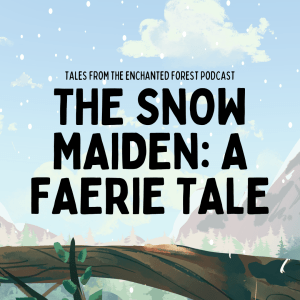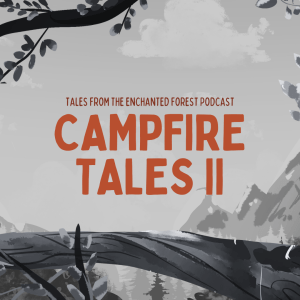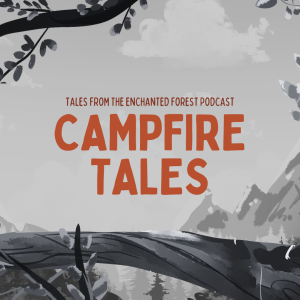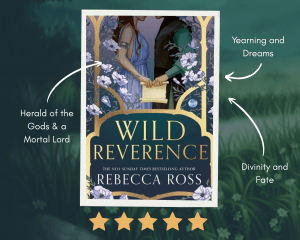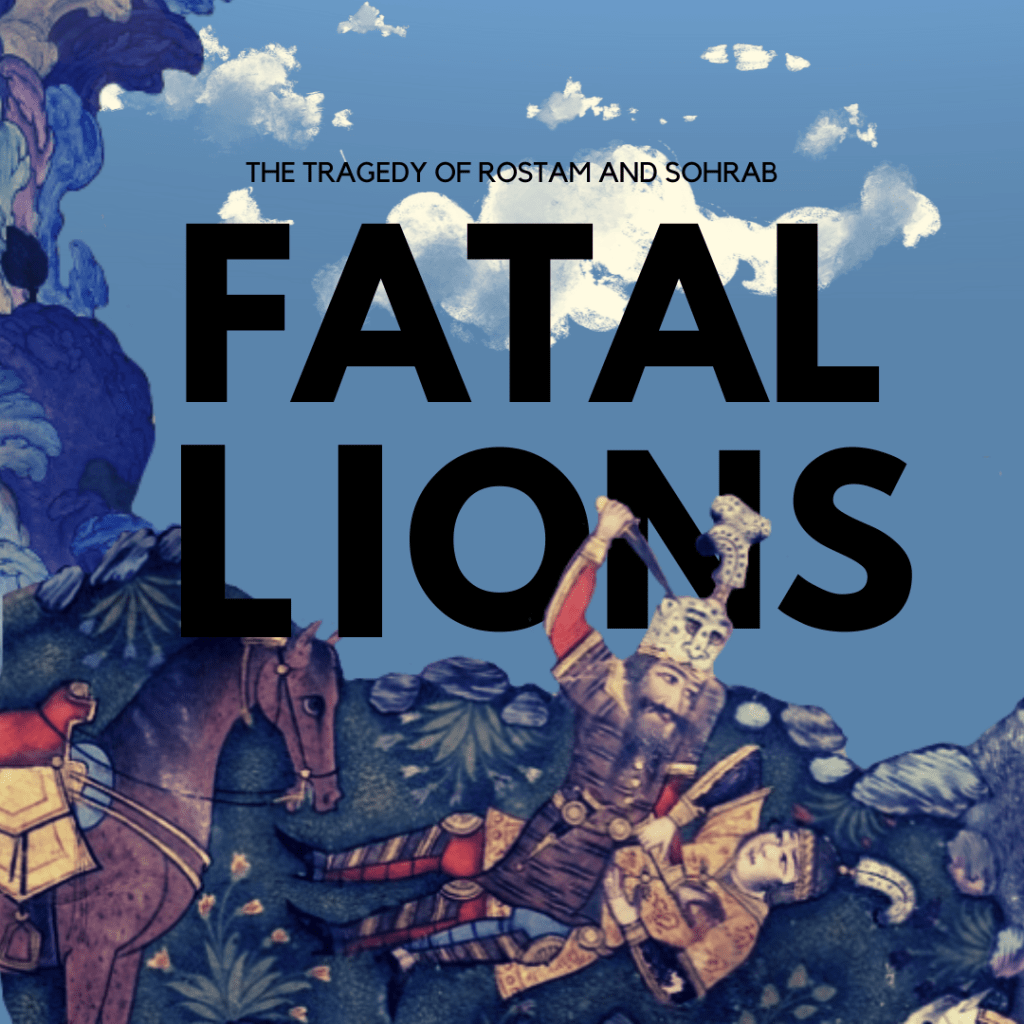
The tragedy of Rostam and Sohrab is one of the greatest in the epic literature world. Listen to the story here or below!
Kay Kavus’ reign was eventful, but sadly, not all that happened was productive or good. Kavus was captured again, started many more conflicts, and got deceived into building a chariot to fly to the sun. Eventually, after all his failures, he became humiliated and humbled. Well, at least for a while.
To see the previous stories, be sure to check out the two previous posts/episodes from Shahnameh.
Rakhsh’s Lost Days
We return to our hero, Rostam, who has fallen asleep after a successful hunt. While he slept, his horse Rakhsh wandered around and was spotted by some Turkish horsemen who captured him and took him away. When he woke up to find his horse missing, Rostam was furious.
He followed the trail to the nearest Turkish city of Samangan. When the King of Samangan heard the Great Crown Bestower would be coming to their city, he threw a great feast and promised Rostam they would find his horse. Rostam promised that if his horse remained lost, then the nobles would also lose their heads. Everyone laughed nervously and poured him glass after glass of wine to keep him happy. It worked because he soon forgot his sharp words.
Rostam and Tahmineh
By the time Rostam retired to his room, he was very drunk. A little while later, he awoke from his drunken stupor to see a lovely princess standing in his room. She said she was Tahmineh and had been longing for him for a long time. Now that he was here, in a place he would never venture before, she would take her chances. Tahmineh boldly said that she wished to bear his son, his heir. In return, she would also help him find his horse. It was a no-brainer for Rostam, who happily agreed.
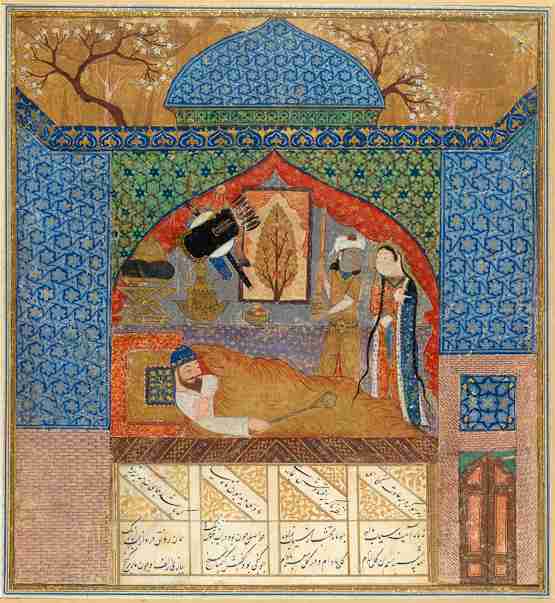
After their sleepover, Rostam gave Tahmineh a clasp from his arm and said if she birthed a girl, then it should be braided into her hair for good luck, but if it was a boy, then he should wear it as a sign of his father- a boy descended from heroes in the line of Nariman.
The next day, the King returned Rakhsh and Rostam left Samangan. Nine months later, Tahmineh gave birth to a happy boy named Sohrab, who grew quickly like his father. Here is a reminder to everyone that the children born from Sam’s line literally grew quickly. They were called mammoth youths not just due to their size but their muscles and strength.
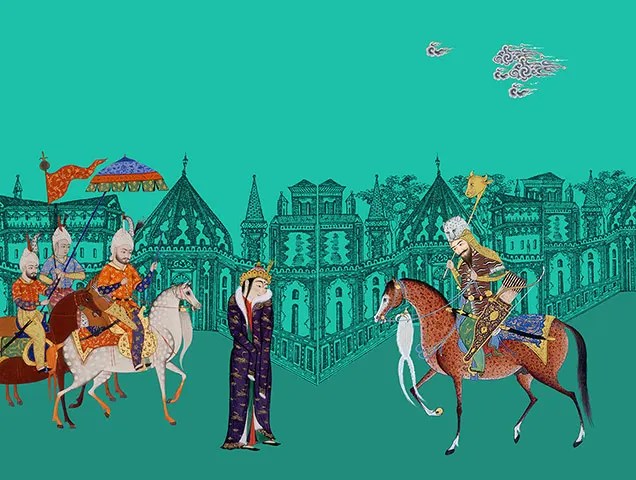
From A Tragedy of Errors: Rostam and Sohrab by Hamid Rahmanian
Like Father, Like Son
When Sohrab was 10, he turned to his mother and demanded to know who his father was. Tahmineh told him it was the great Iranian hero, Rostam. She had letters and treasures that Rostam sent her with exchanges on Sohrab’s well-being throughout the years. However, she begged him to keep it a secret from others because otherwise, the other men would make him a target. She also begged him not to message his father because if Rostam knew how his son was a mammoth youth, he would summon the boy to his side, and it would break her heart.
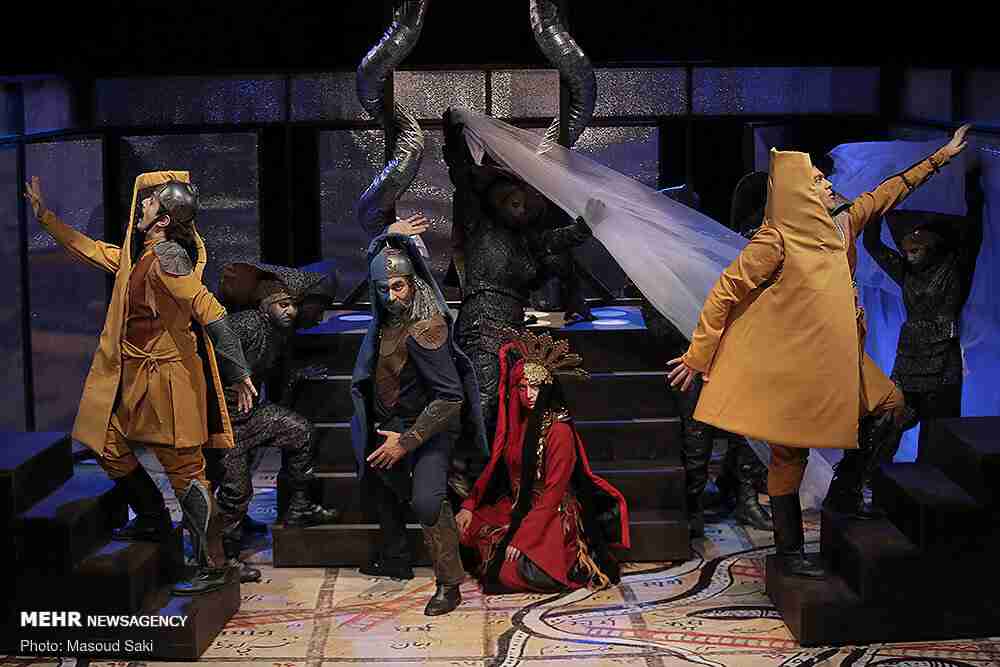
Sohrab, at the ripe age of 10, did not care and said he would gather his forces and fight King Kavus so he could put his father on the throne instead. After all, when the sun and moon shine out in splendour, what should lesser stars do, boasting of their glory?”
The young boy had grown up in Turan, not Iran, so he did not know much about his father except that he was the champion of the King of Iran. Like the rest of us, he had heard about the exploits of Rostam and how he had saved Kay Kavus repeatedly. Sohrab was still young and did not understand that Rostam was more akin to a Paladin or Holy warrior than just a hero. He believed in the divine right of Kings and God’s will. He would have never taken the throne for himself. So, Sohrab gathered his men and began marching on Iran to crown his father.
Side note from Fox
King Afryasyab, who we remember from the last episode as the Turanian King that Rostam heaved over his head, was excited at this child’s courage. He sent his men to march with Sohrab, secretly hoping that Sohrab would kill Rostam in his quest to assassinate King Kavus.
Gordafarid and Sohrab
On his way to the Iranian capital, Sohrab came across the White Fortress and challenged the brave hero and leader, Hejir. Before he could kill the man, Hejir begged for his life. Sohrab thought this was funny and the best an Iranian hero could do. He spared Hejir and made him a prisoner in his cavalry. Inside the fortress, the people mourned Hejir- except for the daughter of another warrior, Gordafarid. She was disgusted by his plea to save his own life instead of dying honourably.
Gordafarid donned her armour, hid her hair under her helmet and rode out to meet Sohrab’s army. She called out a challenge to the men, hoping to lure out the young hero. It worked because he rode out to meet her.

The two battled intensely, and she proved to be a strong archer and swordsman. When they were both tired and weary with their swords locked in an embrace, Sohrab grabbed her helmet to unmask his worthy opponent. Her hair flew loose, and she looked up at him with her big, beautiful eyes- he faltered. He had never seen anyone that was as beautiful.
In some versions, he falls in love immediately and begins calling her his ‘beauty’ in an arrogant way. In others, he laughs at her.
Fox
Gordafarid knew there was no way to get past him except through trickery, so she used his arrogance against him. She said that if his men saw that his opponent was a woman, they would ridicule him. The only solution was to let her flee to the fortress and then capture her in secret within the walls.
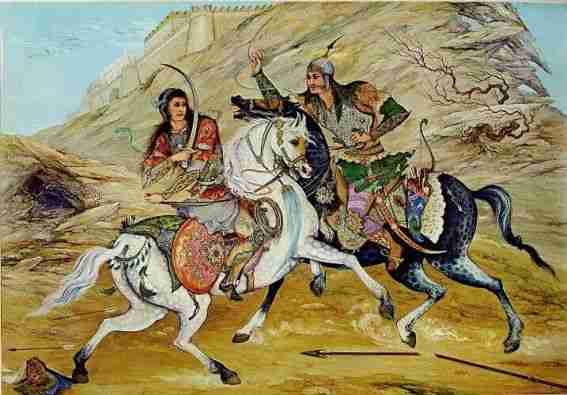
Sohrab agreed, but as soon as she had cleared the gates, they closed behind her. She climbed the wall and stood on the battlements to address the invaders. Laughing, she told Sohrab and his army to go home. He would not find a Persian bride here, and he would die soon at the hands of Rostam. The fatted cow knows nothing of the knife, so he should flee now.
Image of Sohrab and Gordafarid fighting by Mahmoud Farshchian.
Humiliated, Sohrab plundered the nearby land and waited for morning to destroy the White Fortress. But the next day, when the men broke through the walls, they found no one and nothing there. Overnight, Gordafarid had evacuated the city and sent word to King Kay Kavus.
The Reluctant Hero
Alerted, King Kavus sent word to Rostam, and Rostam was astonished at the news of a young hero coming out of the Turks. In a strange twist of irony, Rostam reflects on his young son in Samangan, but he recalls that his son was still a young boy and would not know the glory of war yet.
The idea that Rostam knows about his son is specific to one of the versions we read, which was the Dick Davis translation. In other translations, there were rarely any mentions of Rostam knowing about his son.
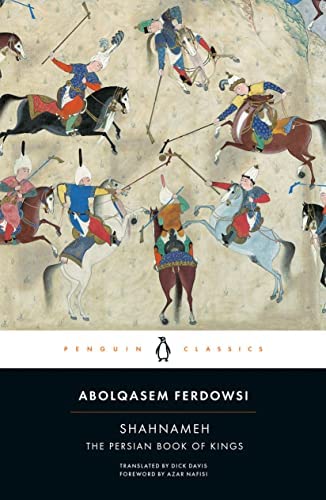
However, despite the war summons from his King, Rostam drank and feasted for three days before he decided to head over to the capital. This behaviour rightfully angered Kay Kavus, and when Rostam finally appeared, they had an Achilles and Agamemnon-style showdown. Kay Kavus ordered the others to grab Rostam and have him hung at once for his disobedience. Meanwhile, Rostam, who had saved Kavus on many occasions, demanded to know who Kavus thought he was talking to! Rostam stormed out, promising that not even the fall of Iran would make him return
Everyone watching this exchange was terrified, so they appealed to the King to apologize- otherwise, they would all die. King Kavus accepted and gave a sort of apology where he said he was as God had made him and, sadly, God made him a temperamental man. Rostam agreed, and they decided to put it behind them. They drank all night together to prepare for the next day’s war.
Sneaking around with Rostam and Sohrab
The next day, the two armies came within reach and set up their respective camps. Rostam disguised himself as a Turk and snuck into Sohrab’s camp to see the young warrior. To him, Sohrab looked like a mammoth youth, the image of Rostam’s grandfather Sam. Instead of taking this as a hint, Rostam thought it was a strange coincidence and left after killing one of the main noblemen.
Kay Kavous Reaches for the Heavens
From The Follies of a King: Kay Kavous by Hamid Rahmanian

Sohrab summoned his prisoner, Hejir, and the two found a spot overlooking the Persian army. Sohrab pointed to the various pavilions and asked which hero or lord they belonged to. Hejir, knowing the man was looking for Rostam, purposely lied. At one point, Sohrab pointed out a man seated under a green banner with a dragon and golden lion. Next to the man was a magnificent horse. Hejir mused that it was some lesser lord that he did not recognize. Sohrab was distraught. He had, after all, waged this war simply to see his dad.
The Battle of Rostam and Sohrab
In his anger, he rashly rode forth and challenged the Persian heroes to a battle. No one wanted to fight the man. Kay Kavus began getting nervous and sent someone to summon Rostam. Grumbling and annoyed, Rostam reluctantly rode forth. Upon seeing the man, Sohrab was confused and asked the man if he was Rostam. But Rostam responded that he was not and that he was just another slave. This deception would be a fatal one.

The two fought until dark and split off, tired and weary until the next day. That night, Rostam spoke to his brother, Zavareh. He said that the next day, Zavareh was to keep their men ready, and if Rostam lost, his brother was to flee at once with their men and go to their father, Zal. The two brothers spoke at length about their worries until it was time for bed.
When morning came, the two men met on the battlefield again, and Sohrab was even more convinced that this was his father. He offered a truce. He said the two men would throw down their weapons and feast here. They should drink together. He all but begged Rostam to tell him who he was.
Rostam responded that they were here to fight. And so, they fought. Right from the start, Sohrab had the upper hand, and he towered over Rostam, ready to decapitate him when Rostam spoke. Rostam said it was not their custom to kill a man the first time he fell. To be a true hero, you had to do it the second time. Sohrab was still new to war, so he believed the older man and let him go.
Third Times the Charm
They fought a third time, and this time, Rostam gained the upper hand. He threw Sohrab down to the ground and stabbed him in the chest.
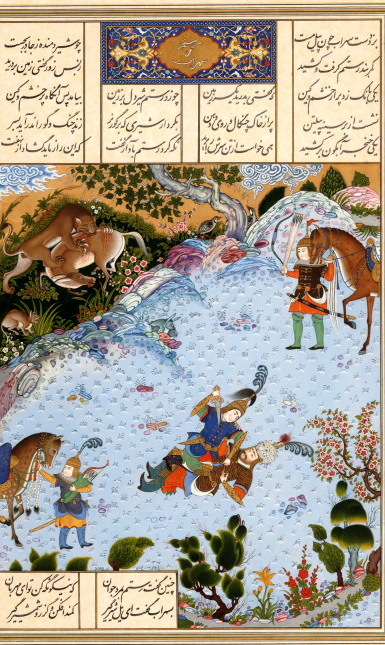
As he lay dying, Sohrab spoke:
Love for my father led me here to die.
My mother gave me signs to know him by,
And you could be a fish within the sea, Or pitch black, lost in night’s obscurity,
Or be a star in heaven’s endless space,
Or vanish from the earth and leave no trace,
But still, my father, when he knows I’m dead,
Will bring down condign vengeance on your head.
One from this noble band will take this sign
To Rostam’s hands, and tell him it was mine,
And say I sought him always, far and wide,
And that, at last, in seeking him, I died.”
Rostam and Sohrab fighting. From Shah Tahmasp (c. 1552).
Rostam roared in grief and desperation, and the dying youth said that if the man had been his father all along then he was dimmed by evil to refuse to answer earlier. Rostam was devastated and attempted to slash his throat, but the other nobles stopped him. In a last fit of desperation, Rostam asked one of them to go to King Kavus and beg him for an elixir he knew the King kept- one that would heal all wounds. He promised that if the King gave the elixir to Sohrab, then the two of them would be his eternal Champions.

Kay Kavus acts like a Jerk- again
Unsurprisingly, the King hesitated.
Sohrab slain by Rostam from the Shahnameh by Mo‘in Mosavver
When news came to Rostam, he rode out to implore the King, but while he was en route, Sohrab died. Rostam was overcome with grief. He tore at his clothes and set fire to his royal pavilion, and no one could comfort him. The tragedy of father and son ends there, but Rostam would have more grief in his lifetime.
Rostam lived a long life, almost 600 years to be exact, and throughout his life, some moments tested his faith in the divine right of the Kings. Including his legendary battle with Prince Esfandiyar when the Simurgh had to bring Rostam back from death’s door and show him the way to victory. Another section relates to Rostam raising Prince Siyâvash, and the tragedy of Siyâvash’s murder.
However, for the sake of time, we will jump forward to the end of Rostam’s life.
The tragedy of Shaghad and Rostam
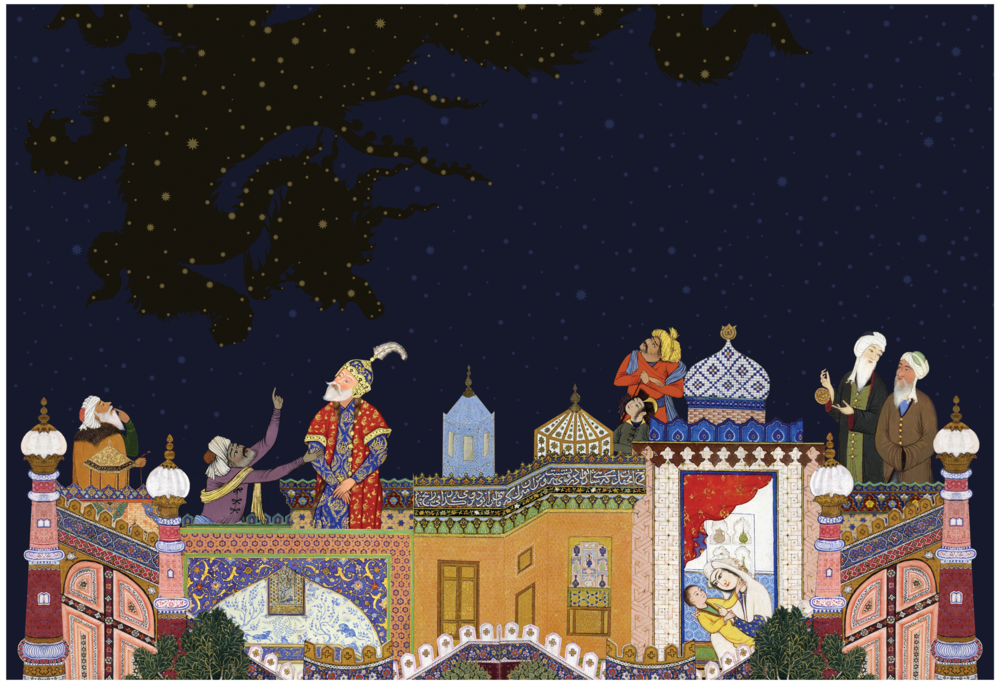
Rostam had another brother by his father and a storyteller. When the boy was born, the sages told of his terrible fate. The boy would be the seed of the family’s destruction. Zal was troubled, but he could not abandon a son after what his father did to him, so he named the boy Shaghad and tried to do his best for his son. When it was time, he sent Shaghad off to the King of Kabol. The King loved Shaghad like his own, and eventually, Shaghad married the King’s daughter, making them family.
The King believed that with Shaghad as his son-in-law, he would not need to send tribute to Rostam anymore, but the tributes continued. Shaghad grew to dislike his brother and the disrespect displayed towards him and his father-in-law. The two men came up with a plan to trap Rostam in what can only really be called the Team Rocket method of murder which was to dig a pit and cover it to lure Rostam and Rakhsh over it.
A Super-Evil Plan
First, they had a fake argument over a feast where the King of Kabol mocked Shaghad for being an abandoned child.
Then, Shaghad went to his father and his brother, the latter of which was excited to see his brother and grew angry and indignant at what Shaghad told him about the King of Kabol. He told his brother that they would march on Kabol and make Shaghad the King.
Together with their brother, Zaraveh, the three marched on Kabol, but when they approached, the King of Kabol fell before them, begging for forgiveness for the words he said while he was “drunk.” Rostam forgave the King and bestowed other honours upon him.
The men feasted and drank merrily. Afterwards, they were lured out on a hunt around the gardens. When they reached the area with the pits, Raksh could smell the freshly dug earth and moved carefully, frustrating Rostam, who spurred his horse forward.
Falling into despair
Raksh lost his footing and stumbled forward into a pit. The spikes and spears at the bottom killed Raksh immediately and impaled Rostam’s legs. Behind him, Zavareh and the other men fell through pits- dying instantly.
The dying Rostam shoots Shaghad through the trees by Muhammad Yusuf
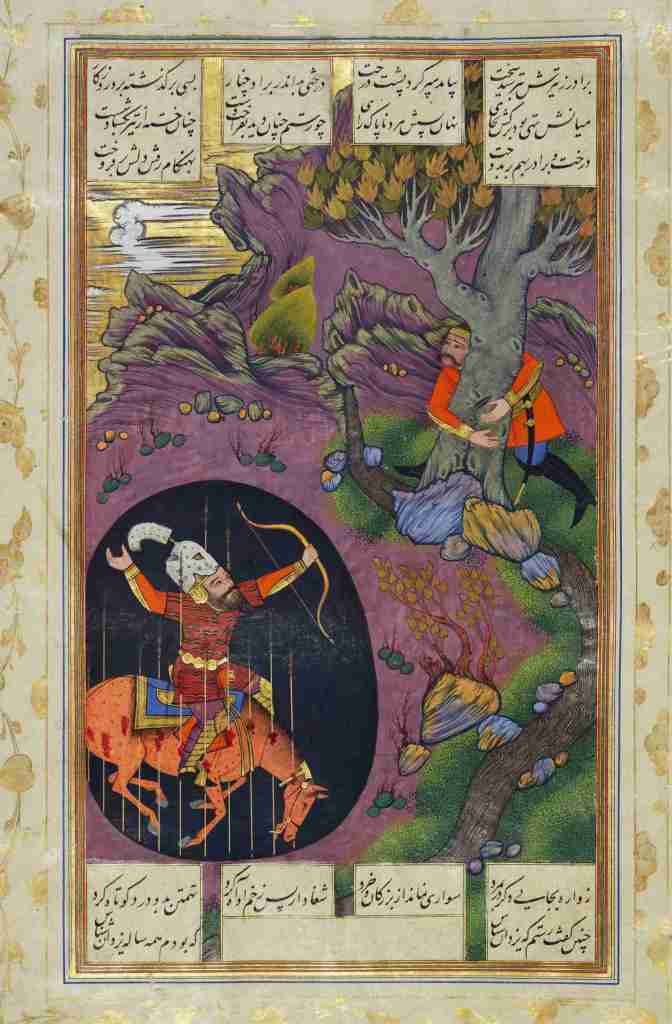
Looking over the edge of the pit, Rostam could see the cheerful face of Shaghad above him. He cursed his brother but asked him that, as a dying favour, he be allowed to have his bow and two arrows. Just in case, a lion came to feast on him while he law dying.
His brother had a moment of stupidity and approached Rostam to string his bow for him. As soon as he saw the bow in Rostam’s hands, he grew fearful and ran to hide behind a tree, but Rostam used the last of his strength to let an arrow fly, splintering the tree and killing Shaghad immediately.
And so, at the age of 600, Rostam died. Leaving his father, Zal and his son, Faramarz, to retrieve his boy and mourn him. In some texts, Faramarz is Rostam’s other brother and he dies trying to avenge his brother
Legacy
The Shahnameh does not explore the life of Faramarz in-depth, but there are other works produced that detail the wars and battles of the young hero. One of which is essentially Shahnameh fanfiction.
There are also stories about a heroine called Banu Goshasp, who is unofficially recognized as Rostam’s daughter in the 900-verse Epic, the Banu Goshasp. She travels with her brother, Faramarz, and there is an incident where she battles Rostam, but they recognize each other quickly. The Banu Goshasp Nama is one of the oldest Epics, specifically about a Persian heroine.

